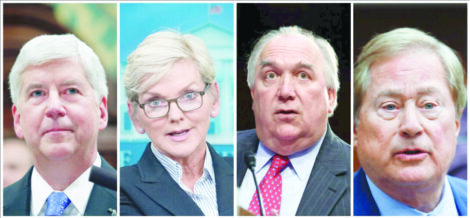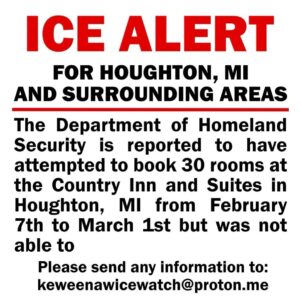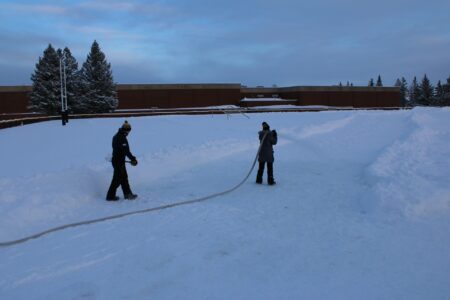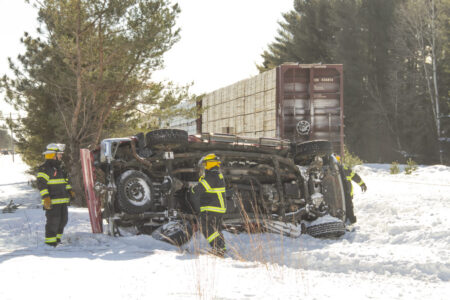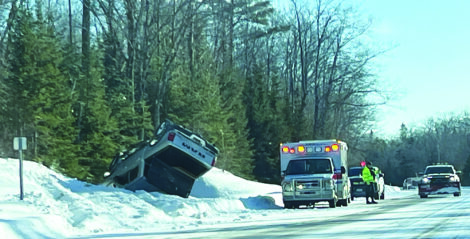Is it really recycled?
Presentation held in Hancock

Ben Garbacz/Daily Mining Gazette A large crowd filled both levels of the Orpheum Theatre Wednesday for the presentation, "Is it really recycled?" presentation by the Copper Country Recycling Initiative and Recycle 906.
HANCOCK — The Copper Country Recycling Initiative(CCRI) and Recycle 906 held a community presentation “Is It Really Recycled?” at a packed Orpheum Theater on Wednesday evening. The presentation encompassed a variety of topics including what happens to materials when sent for recycling, options for materials not able to be conventionally recycled, resources for Copper Country residents for recycling initiatives and an overview of the recycling process and the work conducted by Recycle 906.
Executive Director of the CCRI Jonathan Nagel said the mission of the initiative is to promote sustainable use of materials and advance the circular economy. “What that means is, we need to make sure that the materials we are discarding are recycled so that they can be made into new materials,” Nagel explained. “Currently, we do an okay job here for being a rural area, but certainly we have a lot of improvement to do.”
Statistics were shared that showed materials recycled in the U.P., with a focus on Houghton and Keweenaw Counties, which showed a 26.2 percent diversion rate from 2023. However for municipal solid waste, which accounts for household and small business waste, the percentage is 2.7 on average.
The Western Upper Peninsula Planning and Development Region (WUPPDR) is aiming for Michigan’s threshold of a 30 percent recycling rate and 45 percent by 2030. WUPPDR Materials Management Coordinator Brendon Presnell said Houghton and Keweenaw Counties are behind in reaching their 2029 threshold.
Presnell said the Natural Resources and Environmental Protection Act has been made to be more rigid towards recycling mandates. By 2026 urban areas will need curbside pickup available for the majority of the population regarding recycling. The Western U.P. will not be effected as much, though deadlines set for 2028 and 2032 will effect this region.
Presnell explained municipalities with populations of more than 5,000 will need curbside pickup available, adding these are not numerous in the western U.P. “More than that is counties with less than 100,000, that’s all of the counties within the western U.P., will need to have a recycling drop off for every 10,000 residents within a reasonable driving business by 2032,” Presnell said. “So with this, we are hoping to see some developments and the capacity of the drop off centers that we have, the curbside packages that we have offered at this moment in expanding those services.”
Areas such as Ontonagon, Baraga, L’Anse and Calumet and surrounding areas see heightened efforts for recycling services. Some existing recycle collections in the region include city programs in Houghton and Hancock, drop off locations for residents in Eagle Harbor and Chassell and a public drop off like the Houghton County Transfer Station.
Items that are recycled in the area are transferred to Recycle 906 located in Marquette. Management Supervisor Josh Wales oversees the facility’s operations. He shared overall U.P. statistics on recycling, what items can be processed at the facility and what can be done to items Recycle 906 cannot take. Wales said the U.P. residents only recycles two percent of materials generated in the U.P. and the peninsula is far below the national average.
“There’s a lot of rural places around the U.P. that makes it hard for people to get their material to us,” Wales explained. “In 2022 legislation was passed that if you offer curbside trash, you must offer curbside recycling [and] that has to be implemented by 2027 so we’re trying to get it out there early, so counties and communities know how to do it when they’re bringing materials.”
Wales discussed how materials are processed once they reach Recycle 906, and where they are shipped to be reused. He also explained what people need to do when recycling to make the process more efficient, which includes removing plastic lids from glass jars. If differing material components can be separated before arriving at the facility, the process is easier on the workers and time is saved.
Wales also went over the materials that could not be processed. These include plastic bags and wrap, batteries, electronics, chains, cords and hoses. Locations exist within Copper Country which accept such items, where the materials will be sent off where they can be properly processed. Some locations include Remy Battery in Houghton for batteries and Goodwill in Houghton for electronics and locL grocery stores for plastic bags.
All three speakers encouraged those who wish to see accessibility to recycling expanded to reach out to their local elected officials and inform them of the desired initiatives. Nagel also encouraged those particularly interested in the act of recycling to reach out to CCRI on Facebook and attend their monthly meetings held at the Portage District Library.

